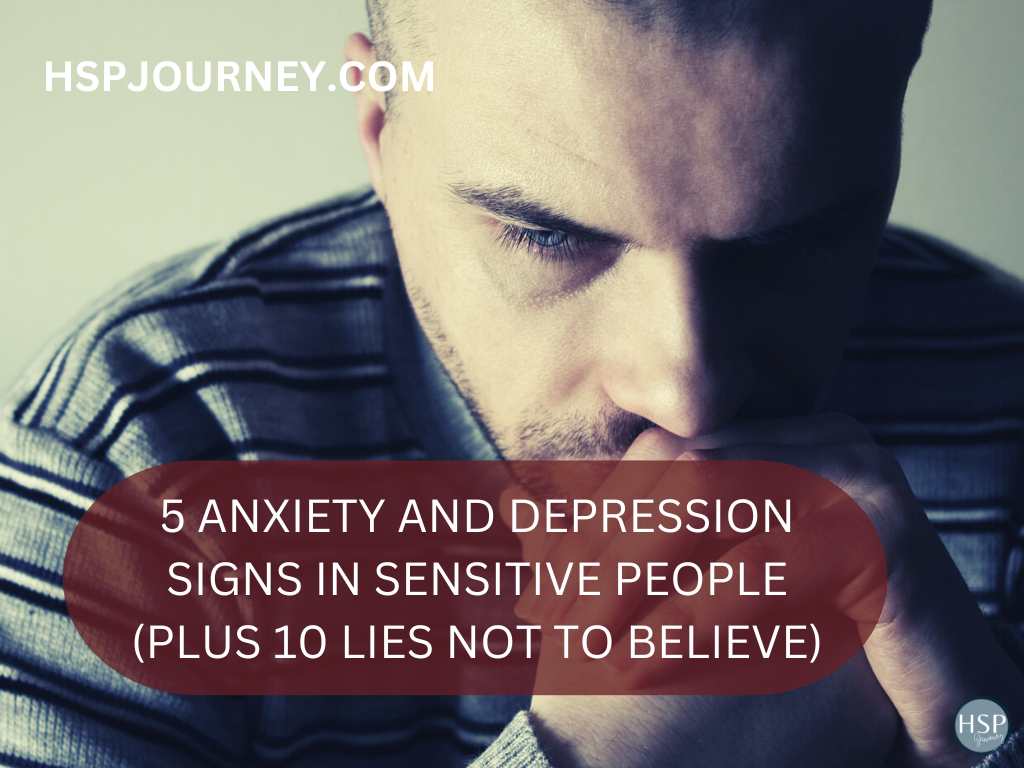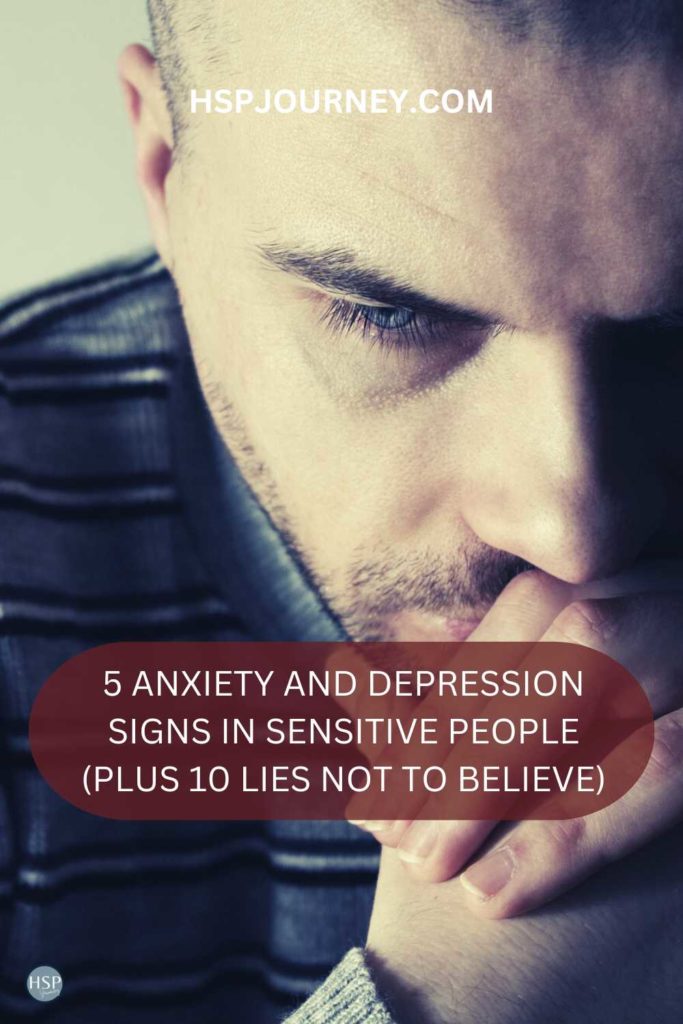Recognizing anxiety and depression signs in sensitive people is crucial–whether you are sensitive or someone you love is a highly sensitive person. The signs of anxiety and depression often sound like deceptive narratives that subtly infiltrate your thoughts, leading you to believe that “this is life” with little hope for change. Looking closely at the signs of anxiety and depression can help you take steps toward healing.
Identifying these signs empowers you to take control of your life. A vital reminder: If you or someone you know is struggling with self-harm or suicidal thoughts, contact the Suicide & Crisis Lifeline at 988 for 24/7 support. Now, let’s explore how anxiety and depression signs disrupt life from within for highly sensitive people.

Table of Contents
It’s important to note that the signs of anxiety and depression can vary among individuals, and it’s always advisable to consult with a mental health professional for a proper diagnosis. However, here are five common signs associated with anxiety and depression:
Here are the top anxiety and depression signs to be aware of for yourself and others:
Sign #1 – Persistent Sadness or Low Mood
- Frequent feelings of sadness, hopelessness, or emptiness.
- Loss of interest or pleasure in once enjoyable activities.
- Difficulty experiencing positive emotions.
Sign #2 – Changes in Sleep Patterns
- Insomnia or difficulty falling asleep or staying asleep.
- Excessive sleep or difficulty getting out of bed.
- Disrupted sleep patterns and poor sleep quality.
Sign #3 – Changes in Appetite or Weight
- Significant changes in appetite, leading to weight gain or loss.
- Loss of interest in food or comfort eating.
Sign #4 – Fatigue and Lack of Energy
- Persistent fatigue, even after rest.
- Decreased energy levels and motivation for daily activities.
Sign #5 – Difficulty Concentrating and Decision-Making
- Trouble focusing on tasks or making decisions.
- Memory lapses and impaired cognitive function.
It’s crucial to recognize that these signs can manifest in various ways, and the presence of one or more does not necessarily confirm anxiety or depression. A comprehensive evaluation by a mental health professional is essential for an accurate diagnosis and appropriate treatment. If you or someone you know is experiencing these symptoms, seeking professional help is strongly recommended.
12 Best Books on Anxiety for the Highly Sensitive Person
Now, here are ten lies not to believe if you or someone you love is struggling with some of these anxiety and depression signs:
Lie #1 – Things are Never Going to Get Better
The paramount message to glean from this compilation of lies perpetuated by depression and anxiety is this: they are, unequivocally, falsehoods.
Your feelings, symptoms, and the impact of anxiety and depression on your life are undeniably real. However, it’s crucial to recognize that you are not flawed, and hopelessness is not your fate.
Moreover, you are not alone.
In moments of doubt about the possibility of improvement, remember that hundreds of millions of people grapple with anxiety and depression. Expert help—be it therapy, support, or medication—is always accessible. You need not bear the burden of anxiety and/or depression in solitude.
Lie #2 – Suicide Would Spare Me and Others from Pain
Suicidal depression, indicative of clinical depression or major depressive disorder (MDD), is a serious concern.
While it’s accurate that most individuals with depression do not die by suicide, those who have experienced suicidal thoughts understand the pervasive belief that it may be the only escape.
One of the cruelest deceptions of depression is the falsehood that suicide is a means to end unbearable pain and spare others from dealing with you. This lie forces a struggle against the primal instinct of self-preservation and distorts your true value in the world and to those who care for you.
In its final act of deception, depression combines all its lies—helplessness, failure, uselessness, meaninglessness—into a suffocating sense of hopelessness.
For anyone at risk of self-harm or suicide, reaching out to the Suicide & Crisis Lifeline at 988 through calling or texting is crucial. Assistance is available 24/7.
Lie #3 – Nothing Really Matters
Cue the song, Bohemian Rhapsody, “Nothing really matters / to me.”
Anyone grappling with depression intimately resonates with the profound line: “Nothin’ really matters, anyone can see. Nothin’ really matters to me.”
It becomes a mantra, echoing in the dark clouds that hover like an angry hornet, a voice you articulate without sound. Its origin lies in an inaccessible, uncontrollable depth within you.
Despite a yearning for things to matter, they simply don’t. Perhaps there’s a vague recollection of a time when significance existed, but that person and that life seems alien now.
Everything appears dull, lifeless, and devoid of meaning or depth. The world seems flat, not spherical. Life feels two-dimensional on the best days, and your reflexive response to everything becomes a resounding “Why bother?”
Depression casts a curse that drains color from life, leaving it in shades of gray. Intellectually, you acknowledge the presence of color, yet you’re unable to perceive it. It becomes a relentless question of whether that vibrant world ever existed or if you’re the realist, contemplating if the rest of the world lives in a fantasy. (For an exploration of the hypothesis of depressive realism, refer to this link.)
Lie #4 – Everyone gets Depressed, So Snap Out of it
This misconception is a significant source of shame for those battling depression.
While everyone experiences periods of emotional sadness in response to life’s challenges, such as loss, unwanted news, breakups, or academic/work setbacks, depression stands apart. It is a psychiatric disorder with specific criteria involving the type, intensity, and duration of symptoms.
Unlike transient feelings of sadness, depression has roots in physiology and genetics, often leaving enduring effects on the body and overall health.
Depression is not a matter of simply “snapping out of it.” It has no connection to character flaws, ingratitude, or the ability to “pull yourself up by the bootstraps.”
Expressions like “Turn that frown upside-down!” and “Too blessed to be depressed!” may seem like well-intentioned slogans, but they can be more harmful than helpful, promoting toxic positivity.
Lie #5 – Depression and Anxiety are All in Your Head and Can’t Cause Physical Symptoms
Depression and anxiety deceptively promote the falsehood that the body and mind are entirely separate entities—an assertion far from reality!
Anxiety subjects the body to a perpetual fight-or-flight state, flooded with stress hormones designed for emergencies. While cortisol and adrenaline have their roles, their continuous presence is counterproductive.
Individuals with anxiety disorders face elevated risks of cardiac and respiratory issues due to this sustained physiological stress.
Meanwhile, depression predisposes individuals to cardiac problems, diminished libido, and chronic pain.
Both anxiety and depression contribute to sleep disturbances, alterations in appetite, and a compromised immune system.

Lie #6 – No One Wants to be Around You, Get Used to Being Alone
Depression and anxiety share a stark reality — they are profoundly isolating experiences.
In the grip of depression, enthusiasm becomes elusive, causing hobbies and interests to lose their allure. Socializing energy seems to vanish.
Anxiety, on the other hand, has a knack for conjuring worst-case scenarios prematurely or fostering a general discomfort with crowds and social interactions.
For those who identify as highly sensitive people, the body’s response to overstimulation mirrors the effects of anxiety.
When in the throes of anxiety or depression, there’s often a convincing belief that the negative mood is palpable, potentially even contagious. This self-perception can lead to a reluctance to be around oneself, raising the question of why others would want to be.
Lie #7 – Worrying Will Actually Change Things
If you’re among the 301 million people grappling with anxiety, you’re likely well-acquainted with the art of worry. Whether it’s fretting, panicking, ruminating, or envisioning worst-case scenarios, it seems you’d borrow trouble if you didn’t already have enough on your plate.
This perpetual worrying often robs you of peaceful nights as your brain refuses to shut down. Scenes and details play on a loop in your mind, ensuring nothing crucial slips your memory.
But for what purpose?
It’s a quest to maintain a semblance of control over your life and surroundings, even if it’s just to feel adequately prepared.
Worry becomes a mechanism to stay one step ahead of the proverbial boogeyman, or at least that’s the perception. And if the boogeyman has already wreaked havoc, there’s an added layer of concern about how to navigate the aftermath.
Lie #8 – You Have Nothing to Offer the World
This falsehood perpetuated by depression stems from cognitive distortion, characterized by exaggerated, false, or irrational thoughts and beliefs. Notably, those grappling with depression are more susceptible to these distortions than those who aren’t.
From all-or-nothing thinking to personalizing, overgeneralization, and emotional reasoning, cognitive distortion tends to magnify negative extremes.
The internal dialogue reinforces a belief that you can never do anything right, a single mistake brands you as a failure, and everyone is ridiculing you. Such distortions extend to doubting your lovability, feeling inferior to others, and deeming your talents as mediocre at best.
Engaging with this deceptive narrative poses a significant threat, as it chips away at your self-esteem and overall sense of self. The erosion intensifies as depression deepens, fostering a breeding ground for even more deceptive lies.
Lie #9 – You’re Lazy
This deceptive notion, a crafty creation of depression and anxiety, capitalizes on the chaos they’ve already stirred in your mood, concentration, cognition, and decision-making. Now, they conveniently shift the blame onto you, making you feel inadequate for not embodying the roles of super-mom, employee of the month, and the Queen of Clean.
Similar to the earlier lie, the twist here is the insinuation that your perceived laziness is the barrier preventing you from achieving something meaningful. Anxiety urges you to sacrifice sleep for ambiguous pursuits just to avoid the label of laziness, leaving you exhausted and frazzled.
Depression complements this falsehood by convincing you that laziness defines you, despite moments of genuine struggle where even getting out of bed feels like an insurmountable task.
Falling into the trap of self-negativity, and berating yourself for not meeting unrealistic expectations, is precisely what depression and anxiety aim for. They want you to perceive the world as a relentless “just-do-it” Nike campaign while reducing yourself to the equivalent of leisurely Keds.
In a world that values speed, competition, and relentless demands, anxiety and depression assert that there’s no excuse for falling behind or being labeled as lazy. As you internalize these messages, bidding farewell to your self-esteem becomes an unfortunate consequence.

Looking for an HSP-Trained coach to help you align your life with your priorities?
Through my Highly Sensitive Person (HSP) certification with the Nickerson Institute, as well as being an HSP, I offer HSP coaching to develop specific goals around your HSP needs. We HSPs frequently deal with anxiety and overstimulated nervous systems that prevent us from achieving peace and attaining our life goals. HSP coaching with me includes a detailed review of your sensitivities and a mutually-desired plan for growth and management of this superpower to shift negativity and begin seeing yourself as the hero of your own story. (Affordable monthly coaching begins at $150/month.)
Lie #10 – You’re Not Good Enough
Anxiety thrives on this tactic, skillfully blurring the line between aspiring for improvement and ingraining the belief that, at your core, you’re fundamentally inadequate. This notion, never good enough, permeates your being, drawing in the demons of self-hatred. They meticulously recall every mistake, imperfection, and not-quite-perfect effort, attaching them unapologetically to your entire self-concept.
This insidious lie further traps the anxious individual in a relentless pursuit of being “good enough,” fully aware that the cycle’s futility will eventually lead to a deep sense of self-unworthiness. It’s a cycle that often underlies depression, highlighting the intricate connection between anxiety and depression.
At the end of the day, if you’re wrestling with any of these lies or anxiety and depression signs, I encourage you to seek medical help, counseling, coaching, or a combination of resources to heal. Noticing the signs is the first step in the process of improving your mental health. Remember, you are important, loved, valuable, and free to be sensitive.
Be sensitive, be free
*This post contains affiliate links and I will be compensated if you make a purchase after clicking on my links*





[…] Acknowledging and embracing a full spectrum of emotions, including shame, joy, and even depression, can be empowering. By fully experiencing them, you build resilience, create a healthy coping […]